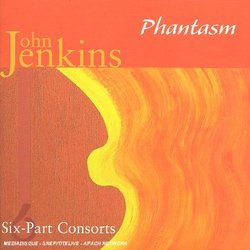| All Artists: John Jenkins, Phantasm, Laurence Dreyfus, Emilia Benjamin, Mikko Perkola, Wendy Gillespie, Jonathan Manson, Markku Luolajan-Mikkola Title: J Jenkins: Six-Part Consorts /Phantasm Members Wishing: 0 Total Copies: 0 Label: Avie Original Release Date: 5/22/2006 Release Date: 5/22/2006 Album Type: Import Genres: Jazz, New Age, Classical Styles: Instrumental, Chamber Music, Historical Periods, Baroque (c.1600-1750), Classical (c.1770-1830) Number of Discs: 1 SwapaCD Credits: 1 UPC: 822252209921 |
Search - John Jenkins, Phantasm, Laurence Dreyfus :: J Jenkins: Six-Part Consorts /Phantasm
 | John Jenkins, Phantasm, Laurence Dreyfus J Jenkins: Six-Part Consorts /Phantasm Genres: Jazz, New Age, Classical |
Larger Image |
CD Details |
CD ReviewsGlorious, sublime David I. Cahill | Beijing, China | 11/09/2006 (5 out of 5 stars) "For a long time my favorite classical cd was John Jenkins' Consort Music for Viols in Six Parts by Hesperion XX and Jordi Savall (Astree ES 9962). I didn't understand how it would be possible to surpass either Jenkins' music or Savall and Hesperion's interpretation of it (whichever came first), but I lamented the absence of other versions for comparison's sake. I finally located this newer version by Phantasm of the same works by Jenkins, curious as to how they would mangle them. To my astonishment, Phantasm surpasses Savall's version. Their performance of these ethereal, transcendant works is truly inspired and brilliant. Where Savall's group is measured and stately, allowing the awesome sonorities to sing, Phantasm attacks the music with a nervous gusto and fierce intelligence, pulling apart the voices and bringing them together with great dramatic tension and surprise, as if these were an early incarnation of Beethoven's late quartets. I hope Phantasm is planning a recording of Jenkins' contemporary William Lawes' Five and Six-Part Consort Sets - the other great masterpiece of early Baroque chamber music (also given a superlative reading by Savall and Hesperion; and while we're at it, Phantasm should also give Christopher Simpson's The Four Seasons a go). Jenkins in fact wrote hundreds of works over a long career, and I'm curious to know why Phantasm chose to record the same works as Savall's recording - to compete against it? Surely there must be many other amazing compositions by Jenkins out there waiting to be studied and performed (e.g. his Fantasias and Airs, already recorded in a less-than-convincing version by the Locke Consort (Channel Classics CCS 17698))." Instrumental treasures from the early Baroque Eddie Konczal | 09/14/2006 (4 out of 5 stars) "John Jenkins (1592-1678) is not the first or perhaps even the twentieth composer that comes to mind when considering the Baroque era. Even among English composers of the period, his oeuvre is overshadowed by countrymen Byrd and Bull and (later) by Purcell. Hopefully, this remarkable collection of viol consorts performed by the ensemble Phantasm will elevate Jenkins' status among the pantheon of Baroque masters.
Jenkins' works occupy a territory between Renaissance charm and high Baroque stateliness. Most of these works are fantasies in the 3 to 5 minute range, developed around a single theme which passes from one viol to another in imitative fashion. An occasional pavan appears; this was a Renaissance dance form whose popularity carried over to the Baroque era. Other than some variation in tempo, the pieces exhibit little diversity as a group; Jenkins has sacrificed variety to achieve consistency of form and unity of purpose. Phantasm is a four-piece consort (Laurence Dreyfus - treble viol and direction, Wendy Gillespie - treble viol, Jonathan Manson - tenor viol, and Markku Luolajan-Mikkola - bass viol), ably assisted here by viol players Emilia Benjamin and Mikko Perkola. Jenkins allegedly composed these works for amateurs to perform at home (a contention debated in the liner notes), but there's nothing amateurish about these performances. Phantasm's articulate performance adds rich texture to pieces already high in visceral appeal. Let's face it: "Phantasm" sounds more like the name of a heavy metal band than a Baroque ensemble. But don't judge this consort by their name. They've delivered a performance of early Baroque treasures that will please either the casual or experienced listener." |
